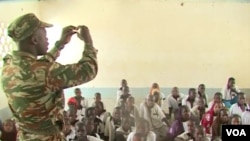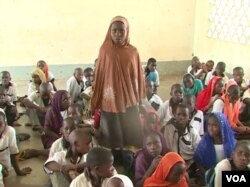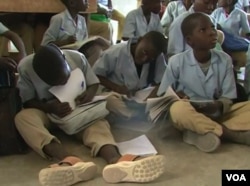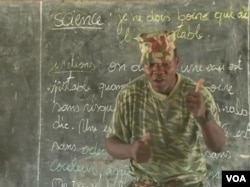In Cameroon's far north region, hundreds of school children in Boko-Haram-affected areas have been returning to class, but their teachers, who fled the atrocities, are absent. The government is calling on them to return, but in the meantime, humanitarian workers and members of the military are providing the lessons for the students.
Haman Dewade, a 37-year-old staff sergeant in the Cameroon army, greets children at a government school in Fotokol, on Cameroon's northern border with Nigeria. Dewade says he fought the Boko Haram insurgency for two years, beginning in 2015. VOA asked him how he found himself in the classroom as a teacher after the war.
He says the Cameroon military hierarchy has instructed them to teach children in preparation for exams, while expecting the teachers will eventually will see that peace gradually is being restored in what had been conflict zones so they can return home and resume their teaching jobs.
Sixteen-year-old Demayi Oumate is among the 14 children in this class. She fled with her parents to the neighboring town of Mora and returned last October. Oumate says the presence of the military in their school, and the fact that no major attack has taken place in Fotokol since they returned, is reassuring that peace really is taking hold.
She told VOA Friday morning the military gives them daily security guidelines before classes begin.
"[They told me this morning that] I should be vigilant and try to detect any sign of fighting or of unknown persons in the school campus," said Oumate. "My plan is to work more hard and then to be disciplined and always be obedient and avoid things that can make me fall in trouble in school."
There are 900 children in the school — down from about 3,000 in April 2015, when it was closed after Boko Haram fighters attacked Fotokol, killing 30 civilians and wounding another 50. Houses, mosques and schools were torched.
It is the only school out of three in the locality that has been opened. Villagers contribute to the safety of the school through self-defense groups they have created. They systematically search all children before they are given access to the school.
Asfamu Djoulde, leader of the Fotokol traditional council, says they also are educating parents to send their children to school.
He says their traditional rulers and the clergy have taken commitments and deployed self-defense groups to the school to make sure that all children returning can receive an education. He says they are educating villagers who continue to drag feet, emphasizing that their children can not make it in this world without an education.
One hundred and twenty-four schools were closed due to Boko Haram atrocities in Cameroon's far north region in 2015. When massive attacks by the insurgents diminished, suicide bombings intensified, making the government reluctant to re-open some of them. The government said more than 400 teachers fled for their lives. The government has told all of them to return to their classrooms or face disciplinary sanctions.
While waiting for their return, the children count on the military and humanitarian workers from United Nations agencies for their education.
While Cameroon has been calling on internally displaced persons to return, officials also are urging caution because the insurgents are using suicide bombers out of what authorities say is last-ditch desperation.
The U.N. Refugee Agency estimates approximately 26 million people in the Lake Chad region have been affected by the Boko Haram violence, and more than 2.6 million displaced.
Cameroon, Chad, Nigeria and Niger all have been calling on their displaced populations and refugees to voluntarily return, but to be vigilant.









